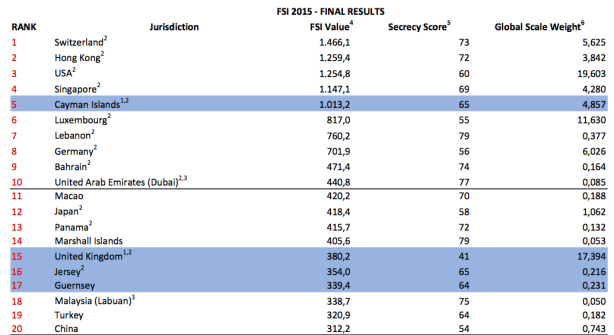From David Ruccio I know all about how corrupt a city can by. I live in Chicago, the “Capital of Corruption.” And I hear all the time about all those other corrupt cities, most of them located in countries in Latin America, Africa, and Asia, which often fall low in the corruption perceptions indices like the one produced by Transparency International. But for all the talk about transparency and the need to tackle corruption at the 2016 Anti-Corruption Summit in London, the host country itself may be the most corrupt in the world. As Joel Benjamin [ht: ja] explains, the indices produced and disseminated by groups like Transparency International “only measure perceived corruption based upon the abuse of public office for private gain, i.e. the payment of bribes.” What they don’t account for is the fact that “While nepotism and subservience to finance capital is rife in Britain and its overseas dependencies, it is not illegal.” At least Chicago’s corruption is transparent. Donate to the mayor’s campaign chest and you get a city contract or assistance with a development project. In the city of London (and other such financial centers in Britain, the United States, and Western Europe), corruption is based on money laundering and financial secrecy.
Topics:
David F. Ruccio considers the following as important: Uncategorized
This could be interesting, too:
tom writes The Ukraine war and Europe’s deepening march of folly
Stavros Mavroudeas writes CfP of Marxist Macroeconomic Modelling workgroup – 18th WAPE Forum, Istanbul August 6-8, 2025
Lars Pålsson Syll writes The pretence-of-knowledge syndrome
Dean Baker writes Crypto and Donald Trump’s strategic baseball card reserve
from David Ruccio
I know all about how corrupt a city can by. I live in Chicago, the “Capital of Corruption.”
And I hear all the time about all those other corrupt cities, most of them located in countries in Latin America, Africa, and Asia, which often fall low in the corruption perceptions indices like the one produced by Transparency International.
But for all the talk about transparency and the need to tackle corruption at the 2016 Anti-Corruption Summit in London, the host country itself may be the most corrupt in the world.
As Joel Benjamin [ht: ja] explains, the indices produced and disseminated by groups like Transparency International “only measure perceived corruption based upon the abuse of public office for private gain, i.e. the payment of bribes.” What they don’t account for is the fact that “While nepotism and subservience to finance capital is rife in Britain and its overseas dependencies, it is not illegal.”
At least Chicago’s corruption is transparent. Donate to the mayor’s campaign chest and you get a city contract or assistance with a development project. In the city of London (and other such financial centers in Britain, the United States, and Western Europe), corruption is based on money laundering and financial secrecy.

And if we measure those forms of corruption, then (as with the Financial Secrecy Index developed by the Tax Justice Network) the tables (so to speak) are turned: Switzerland ends up at the top, the United States rises to number 3, and the United Kingdom rounds out the top 15.
If anything, the bribing of public officials in Chicago, Lagos, Bogotá, and Bangalore is quite transparent—and often involves the siphoning-off of some of the surplus from the initial appropriators to their friends in high places in order to keep doing business. The corruption in Geneva, London, and New York is something quite different and even more pernicious: it involves the laundering of the surplus captured from the entire world so that the economic and political elites who capture it get to keep it and accumulate even more wealth, for themselves and their friends in high places.
All of it legal—and fundamentally corrupt.
